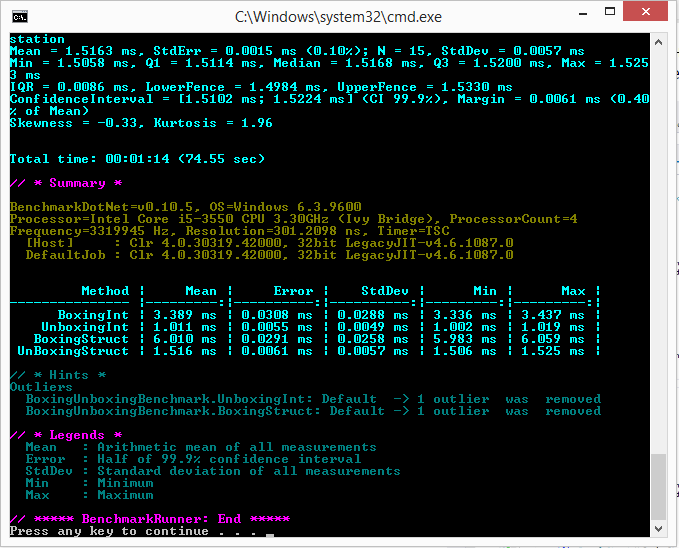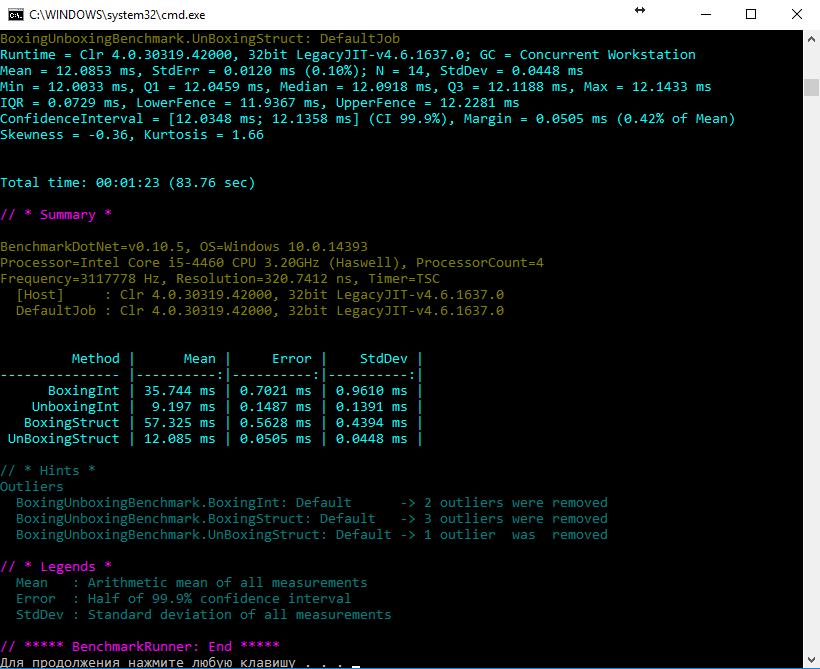Boxing and unboxing - which is faster?

Interested in the question of the speed of the operations of packing and unpacking in .NET decided to publish its small and highly subjective observations and measurements on this topic.
The sample code is available on github , so I invite everyone to report their measurement results in the comments.
Theory
The boxing packing operation is characterized by allocating memory in a managed heap for a value type object and further assigning a pointer to this memory location to a variable on the stack.
Unpacking unpacking, in contrast, allocates memory in the execution stack for an object obtained from a managed heap using a pointer.
It would seem that in both cases memory is allocated and there should not be much difference if it were not for one extremely important detail that is the memory area.
Recalling the fact that the garbage collector (Garbage Collector) is responsible for allocating memory in .NET in a managed heap, it is important to note that it does so nonlinearly, in view of its possible fragmentation (availability of free memory areas) and searching for the required free area of the required size.
Update:
As noted by blanabrother in the comments, when allocating memory / copying a value in a managed heap, there is no process for finding a free memory location and its possible fragmentation due to the incriminated pointer and its further compactification using GC. However, based on the following measurements of the speed of memory allocation in C ++, I dare to assume that the area (type) of memory is the main reason for such a difference in performance.
In the case of unpacking, memory is allocated in the execution stack, which contains a pointer to its end, which, in combination, is the beginning of a section of memory for a new object.
The conclusion from this I do is such that the packing process should take much more time than unpacking, due to the possible side effects associated with GC and the slow speed of memory allocation / copying of the value in a managed heap.
Practice
To check this statement, I sketched 4 small functions: 2 for boxing and 2 for unboxing types int and struct.
public class BoxingUnboxingBenchmark { private long LoopCount = 1000000; private object BoxedInt = 1; private object BoxedStruct = new ExampleStruct { Amount = 1000, Currency = "RUB" }; [Benchmark] public object BoxingInt() { int unboxed = 1000; for (var i = 0; i < LoopCount; i++) { BoxedInt = (object) unboxed; } return BoxedInt; } [Benchmark] public int UnboxingInt() { int unboxed = 1000; for (var i = 0; i < LoopCount; i++) { unboxed = (int)BoxedInt; } return unboxed; } [Benchmark] public object BoxingStruct() { ExampleStruct unboxed = new ExampleStruct() { Amount = 1000, Currency = "RUB" }; for (var i = 0; i < LoopCount; i++) { BoxedStruct = (object) unboxed; } return BoxedStruct; } [Benchmark] public ExampleStruct UnBoxingStruct() { ExampleStruct unboxed = new ExampleStruct(); for (var i = 0; i < LoopCount; i++) { unboxed = (ExampleStruct) BoxedStruct; } return unboxed; } } For benchmarking, the BenchmarkDotNet library was used in Release mode (I will be glad if DreamWalker tells you how to make these measurements more objective). The following is the measurement result:


At once I will make a reservation that I cannot be firmly convinced that the compiler does not optimize the final code, however, judging by the IL code, each of the functions contains the checked operation in the singular.
The measurements were carried out on several machines with a different number of LoopCount, however, the unpacking speed exceeded the package 3–8 times from times to times .
.method public hidebysig instance object
BoxingInt() cil managed
{
.custom instance void [BenchmarkDotNet.Core]BenchmarkDotNet.Attributes.BenchmarkAttribute::.ctor() = ( 01 00 00 00 )
// Code size 43 (0x2b)
.maxstack 2
.locals init ([0] int32 unboxed,
[1] int32 i)
IL_0000: ldc.i4 0x3e8
IL_0005: stloc.0
IL_0006: ldc.i4.0
IL_0007: stloc.1
IL_0008: br.s IL_001a
IL_000a: ldarg.0
IL_000b: ldloc.0
IL_000c: box [mscorlib]System.Int32
IL_0011: stfld object ConsoleApp1.BoxingUnboxingBenchmark::BoxedInt
IL_0016: ldloc.1
IL_0017: ldc.i4.1
IL_0018: add
IL_0019: stloc.1
IL_001a: ldloc.1
IL_001b: conv.i8
IL_001c: ldarg.0
IL_001d: ldfld int64 ConsoleApp1.BoxingUnboxingBenchmark::LoopCount
IL_0022: blt.s IL_000a
IL_0024: ldarg.0
IL_0025: ldfld object ConsoleApp1.BoxingUnboxingBenchmark::BoxedInt
IL_002a: ret
} // end of method BoxingUnboxingBenchmark::BoxingInt
.method public hidebysig instance valuetype ConsoleApp1.ExampleStruct
UnBoxingStruct() cil managed
{
.custom instance void [BenchmarkDotNet.Core]BenchmarkDotNet.Attributes.BenchmarkAttribute::.ctor() = ( 01 00 00 00 )
// Code size 40 (0x28)
.maxstack 2
.locals init ([0] valuetype ConsoleApp1.ExampleStruct unboxed,
[1] int32 i)
IL_0000: ldloca.s unboxed
IL_0002: initobj ConsoleApp1.ExampleStruct
IL_0008: ldc.i4.0
IL_0009: stloc.1
IL_000a: br.s IL_001c
IL_000c: ldarg.0
IL_000d: ldfld object ConsoleApp1.BoxingUnboxingBenchmark::BoxedStruct
IL_0012: unbox.any ConsoleApp1.ExampleStruct
IL_0017: stloc.0
IL_0018: ldloc.1
IL_0019: ldc.i4.1
IL_001a: add
IL_001b: stloc.1
IL_001c: ldloc.1
IL_001d: conv.i8
IL_001e: ldarg.0
IL_001f: ldfld int64 ConsoleApp1.BoxingUnboxingBenchmark::LoopCount
IL_0024: blt.s IL_000c
IL_0026: ldloc.0
IL_0027: ret
} // end of method BoxingUnboxingBenchmark::UnBoxingStruct')
Source: https://habr.com/ru/post/328052/
All Articles